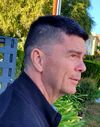What would my everyday tasks look like if they were easy?
Once in a while, he would get an insight that he could write about and eventually do something worthy of a Nobel prize. He did not always know how a note would fit or grasp the connection immediately, but he saved it and could return to it later.

I continue to read How to Build a Second Brain; it's about taking notes. At the same time, I am doing something new that many personal productivity icons recommend. I am taking notes as I read. It has slowed down my reading slightly. I am doing a chapter at one time. Then I am returning to my handwritten notes and putting them into an ultimate brain app created by Thomas Frank. It is a notion template. I have used Notion for the last two years. In that time, I have not gone too far beyond creating a fancy to-do list, a habit tracker for daily use, and a workout tracker and planner. The Thomas Frank template for Ultimate Brain is way more involved and so far above my second brain game currently. Thankfully there are hours of training videos and text instructions to guide me along my path toward Ultimate Brain Perfection.
"Whatever is not saved is lost."
I want to pick up in Chapter 4 with the ominous introductory quote, "Whatever is. not saved is lost." My takeaways are mainly that you should pick a note-taking app that is easy to use. Imagine what an easy note-taking system would look like. Only capture notes that are unique, interesting, personal, and inspirational. Currently, my personal nemesis is to start my notes with an apology for not doing better with taking notes. That kind of mundane apologetic content is maddeningly unhelpful to your future self. Notes should be surprising, and he quotes Claude Shannon. It makes me think of my Bible Study insight that the scriptures had an economy to them. They only chronicle things that are out of the ordinary. It makes for more engaging reading.
12 Favorite problems Richard Feynman, who was regarded as brilliant and won a Nobel prize, used a tool to compare what he experienced with what he was thinking about. This is a simple way to keep your mind from wandering too far afield. He considered 12 questions at a time, from mundane to deep thoughts. As he experienced life, he held up what he was hearing, reading, doing seeing to a series of 12 favorite problems. Once in a while, he would get an insight that he could write about and eventually do something worthy of a Nobel prize. He did not always know how a note would fit or grasp the connection immediately, but he saved it and could return to it later.
I read this book about Richard Feynman. I did not take notes. I came away without insights on the 12 favorite problems tool for focused notes and thinking. What is not saved is lost indeed.
The term food for thought is discussed in chapter four. It's apt because just like what you eat affects your body, what you consume in your thoughts affects your mind. Taking good notes is a high-quality information diet. Grow a thought garden where your notes are the seeds. It resonates with me because, one, I love to eat, and two, gardening is my new side hobby. I get that the better my seeds, the more prolific my harvest.
